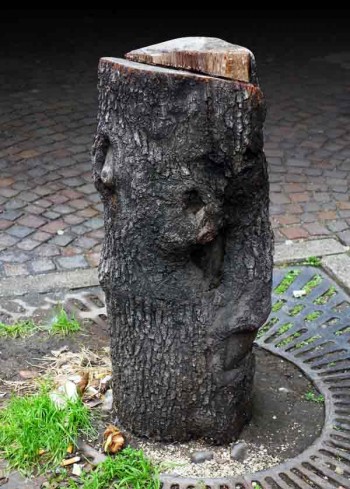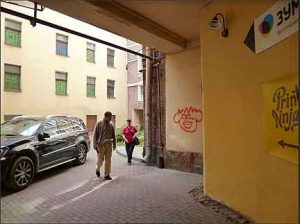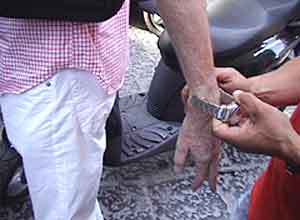How Laws Tie Hands, And Cut Them Off

Sharif spat a mouthful of blood as he laid his right arm across a wide tree stump. He had chewed the inside of his cheeks to shreds in the days since he’d been caught picking pockets in the Grand Mosque at Mecca. As an Egyptian man in Saudi Arabia, he was not entitled to extradition for his crime. He was to be punished swiftly and in public.
Meanwhile, in Spain, Kharem dusted himself off after a police beating, gave a fleeting wistful thought to the cash he surrendered, and went back to work.
“I never hear of pickpockets,” said Dina, an Egyptian woman who works as a tour guide with Abercrombie & Kent in Cairo. “I have never had a tourist in my charge complain of theft. Neither have my colleagues. If someone were to try to steal, the people around would beat him black and blue. They would knock him down and kick him, even burn his fingertips. It just does not happen here. Cairo is such a crowded city, we must live like brothers and sisters.”
Contrast Egypt with Italy, where there are just too many thieves for the police to deal with. Without exception, every police officer we interviewed throughout Italy (and much of Europe), threw up his hands and blew a jetstream of air at our first mention of pickpockets.
And while each officer showed a thorough knowledge of the perpetrators and their methods, we found a serious lack of record-keeping. No information is shared among countries, among agencies, even among stations in a single city. In fact, most officers do not even have computers into which to feed the data.
In Venice, the Municipale Police told us they are only interested in Venice, not in Italy or Europe. Because they never see the actual crime, the squad can’t arrest or jail; they “just open the door to the next city” so the problem becomes someone else’s.
Still, what’s the value of numbers, patterns, and percentages? Italy’s laws work against pickpocket police, and this is typical across Europe. Almost every European official we interviewed (with the notable exceptions of those in Naples and St. Petersburg) blamed the preponderance of pickpocketing and bag-snatching on illegal immigrants. But the countries simply cannot get rid of their illegal aliens.
In Italy, the first problem is administrative. When immigrants are caught without papers, they are politely given 15 days to pack up and leave the country. They are released. And that’s the end of it. The immigrants just do not leave. They do not choose to return to the hellholes from which they came.
Secondly, many of the foreigners have no passports or identification. And without documentation, the north African countries from which many of these people come refuse to accept their repatriation. We cannot expect to see a reduction in street crime thanks to law enforcement without the laws to back them. Their hands are tied.
In Egypt, where people live “like brothers and sisters,” Cairenes live side by side in rivalry and harmony; even men stroll arm in arm, holding hands. Across Egypt, a quasi-vigilantism controls low-level crimes. Misdemeanors and serious offenses are dealt with according to criminal code.
Egypt’s judicial system is based on British and Italian models, but modified to suit the country’s Islamic heritage and influenced by its ancient laws. Most of Egypt’s laws are consistent with or at least derived from Islamic law, the sharia.
If Egyptian pickpocket Sharif Ali Ibrahim had committed his crime in Egypt and had been caught by alert citizens, he would have been severely beaten. If he’d been caught by the police, he’d serve a significant prison term. And if he’d been found guilty of stealing from one of Egypt’s precious tourists, his sentence would have been trebled.
But Sharif committed his crime in Saudi Arabia, in fact at Islam’s holiest place. He had picked the pockets of worshippers praying in the Grand Mosque at Mecca. Therefore, following strict Islamic sharia, Sharif Ali Ibrahim’s right hand was chopped off with a sword, in public.
Excerpt from Travel Advisory: How to Avoid Thefts, Cons, and Street Scams
Chapter Six: Public Transportation—Talk About Risky…







2 Comments
trebled -> tripled?
The tour guides comment about living like brothers and sisters inCairo was a classic. ” We would just knock them down, beat them up and burn their fingers.”